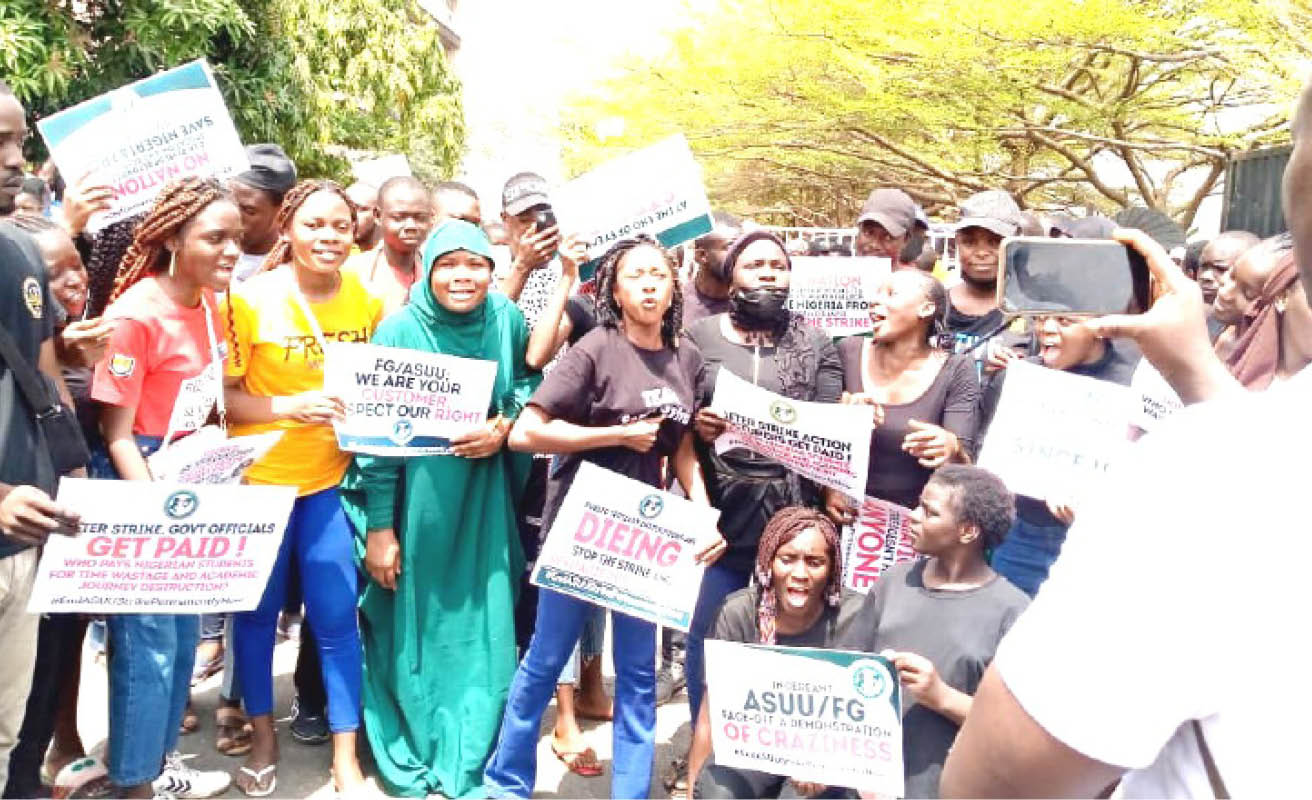Column No.6: Of ASUU strike, and our collective PTSD
From any angle one choses to look at it, the insane game of green light/red light which the Federal Government is playing with a very unwilling Academic Staff Union of Universities (ASUU) beggars belief. When the union declared a nationwide strike on February 14 over issues of poor welfare conditions, failure to renegotiate earlier agreements […]

Nigerian students protest over ASUU strike
From any angle one choses to look at it, the insane game of green light/red light which the Federal Government is playing with a very unwilling Academic Staff Union of Universities (ASUU) beggars belief. When the union declared a nationwide strike on February 14 over issues of poor welfare conditions, failure to renegotiate earlier agreements signed, and other frankly reasonable issues, it was expected that a few weeks would pass and everything would be resolved.
Granted, there have been many nightmare scenarios in the past wherein an ASUU strike would last for what seems like an eternity, but no-one thought there would be anything particularly difficult to be resolved by the ‘warring’ parties. How wrong can one be?
I spoke to a friend of mine about how Nigerian students for many decades now have been suffering from constant strikes to the point that they are afflicted with a weird sort of post-traumatic stress syndrome (PTSD), and her response is that it’s even worse than that. She then asked me if it’s PTSD when the trauma is ongoing and unfolding, in a never-ending cycle of non-physical violence enabled by the Federal Government against our very children. I, of course, kept quiet. Not because I did not have a response, but simply because she spoke the truth.
Many have been quick to blame the universities and their staff, even going as far as saying the quality of lecturers or admin personnel leaves a lot to be desired. It goes even further, with personnel accused of having zero exemplary performance in teaching, researching, and community service, instead being a haven for union leaders pursuing personal quests. Some of the charges border on the mundane – and even petty – positions, criticising lecturers for not being able to speak good English. To be honest, all these ‘accusations’ are a load of manure. It is typical these days for us Nigerians to engage in immature ‘what-about-isms’ wen being stared by a hard-to-solve problem. Instead of focusing on the issue at hand, we will begin to point at other auxiliary, pointless points.
Yes, some of the systems are deplorable, and some staff truly unworthy of the responsibility. But how will all these be solved by ignoring those who work diligently and serve honestly, those who earn a living honourably by imparting knowledge to our youths, and getting them ready for actual adulthood? I ask these questions because a friend of mine who is a lecturer at a university in one of the ‘middle belt’ states called me after a few months, and I was teasing him about ‘abandoning’ us. He matter-of-factly replied ‘You have no choice but to forgive a homeless man’. I asked him what this costly sounding joke meant and he said it means exactly what he said.
You see, my friend (let’s call him Onoja) is a trained Chemical Engineer, and while he passed out of university with flying colours, he could not secure a job in the very sector which he trained for. All the jobs, as we know, go to those who know someone. But I digress. After over half a decade, he finally got an offer at the university he currently works at (or not, since it’s technically on strike).
Now, Onoja is one of the most decent, earnest, brightest people I have been privileged to call a friend, and any school would be so lucky to have him on staff, but the current strike has him seriously looking elsewhere. He has, after all, mouths to feed. Also, remember his ‘homeless’ comment from earlier? Well, he currently cannot afford to pay rent because of the strike, and his landlord has evicted him, leaving him to squat with friends whose rent is also looming. Oh, the trauma of that!
While Onoja searches for another job, he at least has the option of moving to his family house in Abuja, where his wife and kids live. But, as he said to me on the phone, ‘Will we just stare at each other. What will we eat? What if the kids fall sick?’ Imagine being faced with such weighty questions. Also imagine the PTSD that would naturally come from being faced with that kind of stark, harrowing reality, even when you’re supposed to be working. For the Federal Government, no less.
The reason I shared Onoja’s story is that we regularly refuse to look at the human face of a problem, and tackle it monolithically, much like how we approach ethnic diversity, ultimately choosing the easy but shallow path of vilification of anything we don’t recognize, or we feel we are not part of. My point goes beyond empathizing with a close friend’s troubles, but to calling our collective attention to the fact that while students suffer the loss of precious time, even university staff and their families suffer the failure of government to resolve the strike within a reasonable timeframe. Can’t the FG do all it can for their trauma be made to go away, so it’s at least in past tense?
